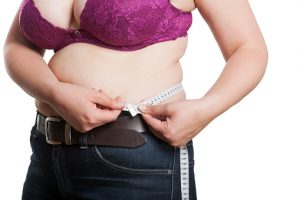 Endometriosis risk is higher in slim women than obese women, according to research. The findings uncovered that morbidly obese women have a 39 percent lower risk of endometriosis, compared to women with an average or normal body mass index (BMI). Women who were morbidly obese when they were 18 years of age had a 41 percent reduced risk in endometriosis, compared to women with normal BMI.
Endometriosis risk is higher in slim women than obese women, according to research. The findings uncovered that morbidly obese women have a 39 percent lower risk of endometriosis, compared to women with an average or normal body mass index (BMI). Women who were morbidly obese when they were 18 years of age had a 41 percent reduced risk in endometriosis, compared to women with normal BMI.
The association was seen strongest in infertile women – women who had been trying to get pregnant for over a year. They had a 62 percent lower risk of endometriosis if they were morbidly obese at the time of the study. Women who were morbidly obese at age 18 had a 77 percent lower risk, compared to women with lower BMI at age 18.
Advertisement
The association was strongest in the group of women who were infertile – those who had been trying to become pregnant for more than a year: there was a significantly lower rate of endometriosis (62%) among the currently morbidly obese compared with those with a low normal BMI, while it was 77% lower among women who were morbidly obese at age 18 compared with those with a low normal BMI at 18.
The researchers wrote, “It is important to note that despite the strength of the evidence underlying the association between body weight and endometriosis, inferences regarding causation or the pathophysiologic process underlying these relations cannot be made.”
The link between body size and the risk of endometriosis is still unclear, but the researchers suspect that BMI at a younger age may affect health later on in life, especially if their size affects other diseases. For example, obese women are at a higher risk for polycystic ovary syndrome (PCOS), which may play a role in endometriosis as it affects hormones.
First study author Dr. Divya Shah said, “Further research is needed to understand the biological mechanisms underlying the associations that we have seen in our study. Maintaining a healthy body weight (BMI 20-24.9 kg/m2) throughout childhood, adolescence, and adulthood is associated with a myriad of known health benefits. The study does not suggest that the morbidly obese women are, in some way, healthier than the lean women and that is the reason for their lower risk of endometriosis. It is more likely that factors related to infertility, which is more common among the very obese, are linked to the reduced risk of endometriosis.”
“Our finding that lean women have a higher risk is useful information for doctors when making a diagnosis. It also means that future research can focus on these women to discover the causes, so that we can design treatments that could help prevent the condition developing,” added Dr. Shah.
The findings come from a research that looked at 116,430 female nurses from 1989 to 2011. During the 20-year study, 5,504 women were diagnosed with endometriosis. The women were 25 to 42 years of age when the study started. They completed questionnaires on their medical history, including weight and height at the age of 18, at the beginning of the study and then every two years that followed.
Senior author Stacey Missmer said, “Analysis of the first ten years of NHS II data revealed an inverse relation between endometriosis and BMI at age 18 among all women, and, in a subset of infertile women, an inverse relation between endometriosis and current BMI. Availability of an additional ten years of NHS II data yielded 2,986 additional cases of endometriosis, and enabled us to trace women who were diagnosed with endometriosis after age 25 through most of their reproductive lifespan. This study confirms that women with a low BMI, both currently and at age 18, have a greater risk of developing endometriosis. The association remains stronger in infertile women, but is present in all women regardless of fertility status. Insomuch as any data can ever claim to be definitive, we do believe that this large prospective study provides conclusive evidence of the inverse association between endometriosis and BMI.”
Other risk factors for endometriosis
Aside from body weight and height, there are other factors that increase the risk of developing endometriosis, a health condition where uterine tissue grows outside of the uterus. Some of these alternative risk factors include, being in the age group between puberty and menopause, having your mother or sister suffer endometriosis, having menstrual cycles less than 28 days, menstrual flows longer than seven days, never having been pregnant, and having uterus, cervix, or vagina of an abnormal shape, which stops or blocks menstrual flow.
If you fall into these risk categories, speak to your doctor about what you can do to possibly reduce your risk and educate yourself about endometriosis, so you know what the disease is about.
Related Reading:
Endometriosis linked to heart disease: Study
A new study has linked endometriosis – the growth of uterine tissue outside of the uterus – and heart disease. The researchers found that women with endometriosis have a 60 percent higher risk of developing heart disease, compared to women without the condition. Continue reading…
Advertisement
Endometriosis risk may be higher with benzophenone-type ingredients in sunscreen
Endometriosis risk may be higher with benzophenone-type ingredients in sunscreen. Benzophenone (BP) can mimic the effects of estrogen, which can increase the risk of endometriosis – a condition in which the uterine tissue grows outside of the uterus, causing severe pain and reproductive issues. Continue reading…
Sources:
https://www.eshre.eu/Press-Room/Press-releases/Press-releases-2013/Slim-women-have-a-greater-risk-of-developing-endometriosis-than-obese-women.aspx
http://humrep.oxfordjournals.org/content/28/7/1783
http://www.webmd.com/women/endometriosis/tc/endometriosis-what-increases-risk
